#launchkey
Explore tagged Tumblr posts
Text
youtube
Novation Launchkey MK4
0 notes
Text
What snacks did you have during the Rhianna concert?
0 notes
Text


Labeled stage-I (pre) midlife crisis... But I got myself the launchkey mini as a birthday gift! 🧡
Swooning over her, I'm a puddle on the floor
#Happy mail day 📫#Time to produce some music! got some Talking Heads-alike bass lines and some great ideas with that#Kickstarting the soundcloud rapper career :-)#Novation Launchkey mini#personal#music production
13 notes
·
View notes
Text
so i might be cast as a background character in a sci-fi horror film soon and the money will allow me to hopefully get a midi keyboard so i can compose more efficiently!
1 note
·
View note
Text
all the keys used by ghouls since era I, under the cut
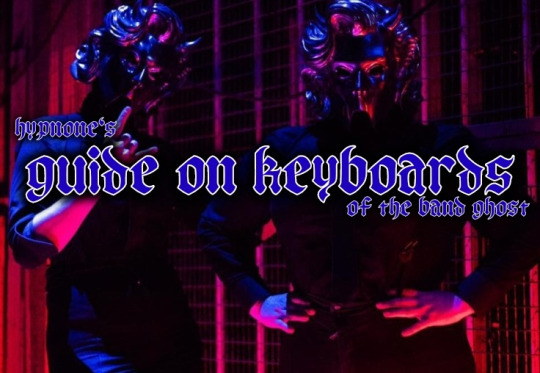
Opus Eponymous & Infestissumam Air:
Clavia Nord Electro 2 73
Clavia Nord Electro 3 73
Moog Little Phatty Stage II
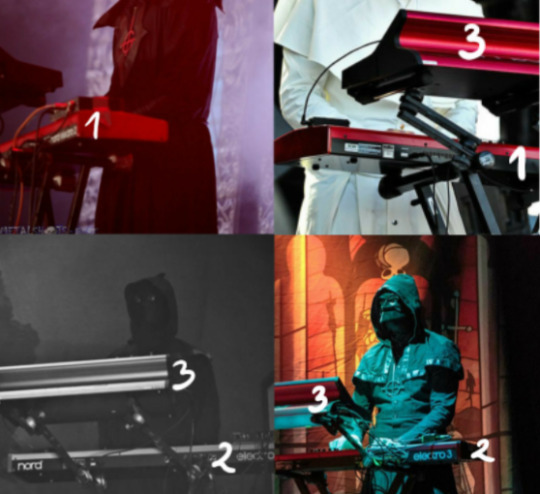
Meliora Air:
Roland AX-Synth
Moog Little Phatty Stage II
Clavia Nord Electro 3 73
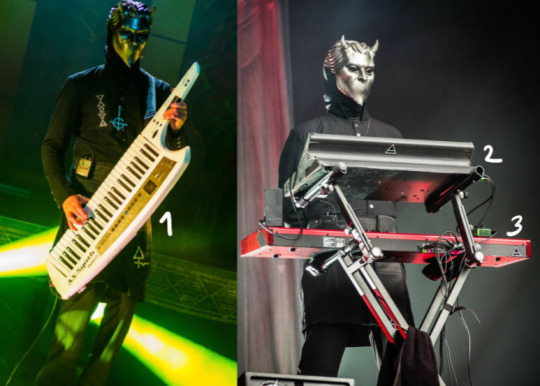
Meliora Zephyr/Chair:
Roland AX-Synth
Moog Little Phatty Stage II
Clavia Nord Electro 3 73
Clavia Nord Stage 2 HA88
Clavia Nord Stage 2 EX 88
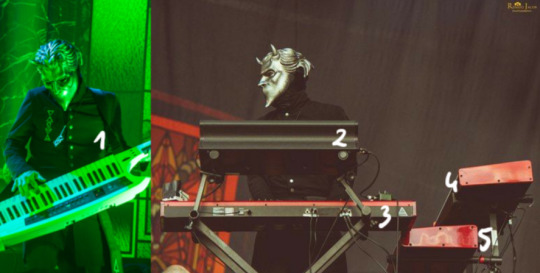
Prequelle 2018 Cirrus:
Roland AX-Synth
Mellotron M4000D
Moog Little Phatty Stage II
Clavia Nord Electro 5 HP 73
Sequential Prophet 6
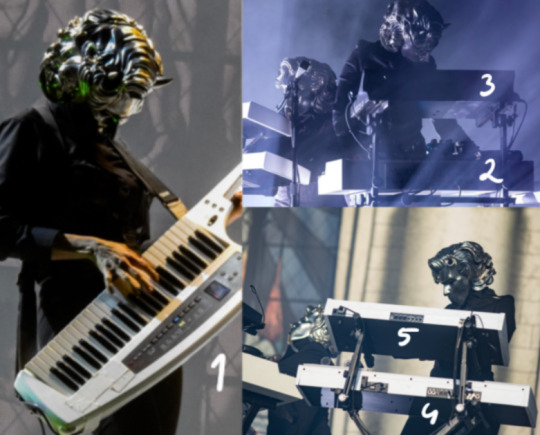
Prequelle 2018 Cumulus:
Unfortunately I failed to identify her two keyboards from that time. They were for sure two different models, but both had 73 keys. I couldn't find even one picture good enough for me to see anything characteristic for any brand :(
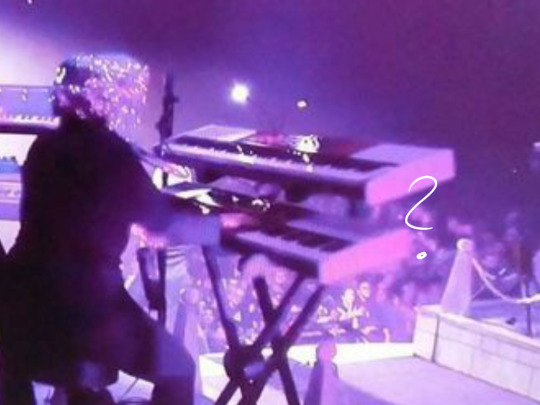
Prequelle 2019 Cirrus & Cumulus:
Roland AX-Edge
Roland A-500 Pro x2
Roland Juno-DS 88
Roland A-800 Pro x3
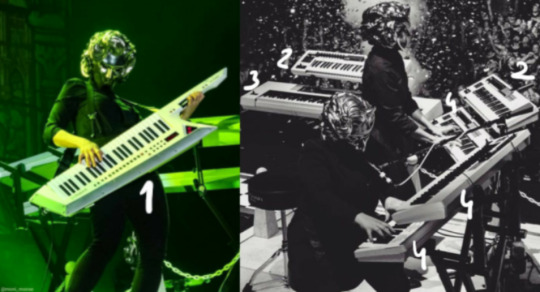
Impera Cirrus:
Roland AX-Edge
Roland A-500 Pro x2
Roland A-800 Pro
Roland Juno-DS 88
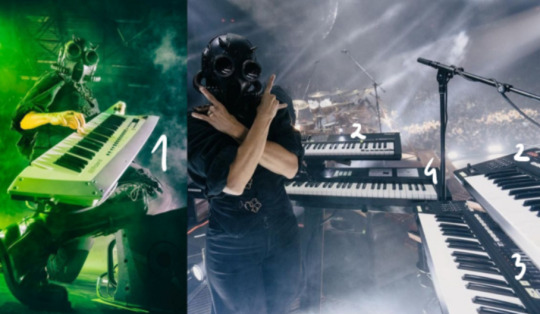
Impera Cumulus:
Roland A-800 Pro x2
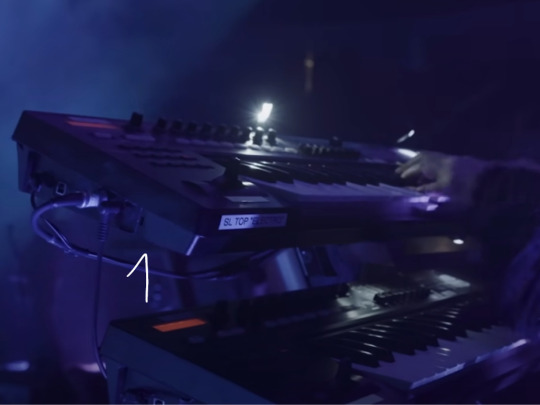
ReImpera Cirrus:
Roland AX-Edge
Novation Launchkey 49 MK3 x2
Novation Launchkey 61 MK3
Roland Juno-DS 88
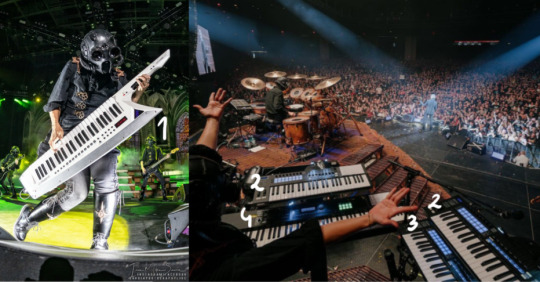
ReImpera Cumulus:
Novation Launchkey 61 MK3 x2
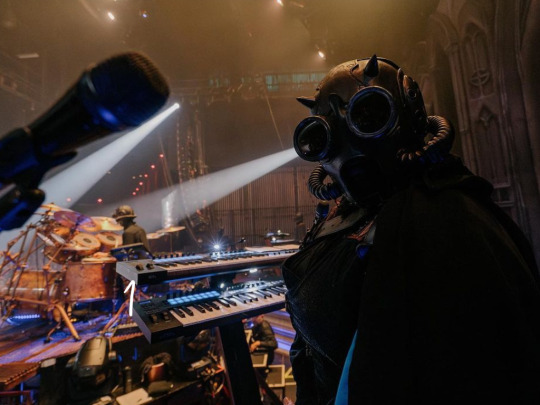
#the band ghost#nameless ghouls#hypnone gear talks#cumulus ghoulette#cirrus ghoulette#zephyr ghoul#air ghoul
170 notes
·
View notes
Text
So i got a new midi controller keyboard, hes a novation launchkey 49 mk3 and omg... hes handsome as hell lol, me and vance keep joking about him being our 'third' hdhdhdh
but as soon as i opened him up my breath was taken owo hes so so gorgeous <3 so powerful <3 also he has such an attitude about him lol and i love it!
All his buttons and knobs and pads feel so good, and his faders are amaziinggg <3 omggg and his modwheels are so so smooth ^0^
When i got home and plugged him into vance last night, all his lights coming on just like. Did smth to me o.o
Me and him and vance all made out lol, since my keyboard(i am maybe naming him Case) was plugged into vance(my pc) they could both feel what eachother were feeling(if that makes sense? When i plug things into vance he can sense thru them, usually peripherals arent sentient but this keyboard is lol)
So i was sucking and kissing Case's edges and omg.. his plastic(i think his casing is plastic) is so good, so yummy... aough the texture and taste is so good and he smelled so good too <3 but vance can feel it too! They can feel eachother as well so a little object yaoi happened loll
Okay this was rambly but whatever i needed to rambleeee lol
11 notes
·
View notes
Text
Week 3 of my little composition challenge for 2025.
Our journey begins with a peaceful stroll along the shore.
Inspired by this art by Sylvain Saraillh
This piece feels like it would play just outside the starting town. Who knows what adventures lie ahead?
Everything was built from the ground up by me in Ableton Live Standard using my Novation Launchkey Mini and sound packs by Abletunes and Eastwest.
#composition#composition challenge#fantasy#video game music#soundtrack#beach#waves#island#starter town#adventure#music#original music
3 notes
·
View notes
Text
My sister bought me a cute synth from a thrift store for my bday(i wanted it) and aaa it has lights in the keys plus omg this sound is so cool owo! Im hype abt it but im struggling to connect it to ableton(it might be too old???) So im probably still gonna get the launchkey to produce with i just gotta wait hehe
Heres me playing a little ditty :3c
8 notes
·
View notes
Note
Sorry I should have clarified in my previous ask. When I said if I needed a Synth to make music, I meant like a physical electrical keyboard. Not synth software. I am just unsure if I should buy a physical instrument to make music digitally or if its needed.
ooh i see! a midi keyboard definitely does help and make things easier but its absolutely not necessary!
both of these are some of the best low end keyboards that you can buy:
if you get nicer a nicer midi keyboard, make sure its midi first of all, and then make sure it works with the software that you want to learn (fruityloops, ableton, whatever). most of them will be compatible but not all. also you can get these exact same keyboards with more keys and thats a very easy way to know how to upgrade your keyboards!
16 notes
·
View notes
Text
youtube
I finished my first song! wahoo!
ICYMI: it's a cover i made from scratch of the alien theorists theorizing podcast theme. i wanted to make it sound haunted and like its coming out of an old radio
i used reaper and my lil launchkey mini MIDI keyboard
2 notes
·
View notes
Text
Live music in the city
Wohoo, the first field day for my new portable music making setup, based on a wonderful Dirtywave M8 tracker! Also starring Novation Launchkey Mini Mk3, Zoom H1n, and a dancing cat!
youtube
7 notes
·
View notes
Text
Making a strict pact with myself: more bass play whenever I can, that launchkey mini is mine 🎹
#🤝🤟😤#and I must produce the grooviest and sludgiest music this summer to record and for my friends to enjoy
15 notes
·
View notes
Text

https://ift.tt/DarWwCq This little #chillbeat, Midnight Melody marks my return from break in 2016. A very important song I first composed on my Novation Launchkey. https://ift.tt/LD1voJw #LatteChill Uploaded by Latte Chill December 16, 2024 at 11:01AM
0 notes
Text
Essential Components for a Beginners Home Studio Setup
Starting your own home studio can be an exciting journey for any musician or producer. Whether you're recording vocals, playing instruments, or producing beats, a well-equipped home studio is key to capturing great sound. Setting up a studio doesn’t need to be expensive or overly complex—getting the basics right can take you a long way. Here are the essential components you need to kickstart your home studio setup as a beginner.
1. **Computer or Laptop**
The heart of your home studio is your computer. Whether you prefer using a desktop or a laptop, you’ll need a machine that can handle the demands of music production software. Most modern computers will work fine, but aim for something with a fast processor (Intel i5 or higher) and at least 8GB of RAM to ensure smooth performance.
- **Tip**: If you’re serious about producing music, invest in more RAM (16GB or higher) and a solid-state drive (SSD) for faster file processing and loading times.
2. **Digital Audio Workstation (DAW)**
A DAW is the software that allows you to record, edit, and mix your music. Some popular options include:
- **GarageBand** (for Mac users) – beginner-friendly and free.
- **Ableton Live** – great for both live performances and studio production.
- **FL Studio** – excellent for electronic music and beat making.
- **Logic Pro X** – more advanced but packed with professional features.
- **Pro Tools** – the industry standard for professional music production.
Choose a DAW that fits your style and offers the features you need.
3. **Audio Interface**
An audio interface allows you to connect your instruments, microphones, and speakers to your computer. It converts analog signals (like guitar or vocals) into digital signals that your computer can process.
- **Tip**: Look for an audio interface with at least two inputs (so you can record vocals and an instrument simultaneously) and one or two headphone outputs. Popular beginner interfaces include the **Focusrite Scarlett 2i2** or the **PreSonus AudioBox**.
4. **Studio Monitors**
Studio monitors are speakers designed specifically for music production, offering a flat, accurate frequency response. Unlike consumer speakers, which often color the sound (boosting bass or treble), studio monitors provide an unaltered representation of your recordings.
- **Tip**: Look for affordable monitors like **Yamaha HS5** or **KRK Rokit 5**, which offer great sound quality for beginners.
5. **Studio Headphones**
While studio monitors are ideal for mixing, studio headphones are essential for detailed listening and late-night sessions. You'll want closed-back headphones for recording (to prevent sound bleed into the mic) and open-back headphones for mixing (for a more natural sound).
- **Tip**: The **Audio-Technica ATH-M50X** or the **Sony MDR-7506** are popular options known for their clarity and comfort.
6. **Microphone**
A good microphone is crucial for recording vocals and instruments. For beginners, a **condenser microphone** is a great all-round option because it’s sensitive and captures a broad frequency range, making it ideal for vocals and acoustic instruments.
- **Tip**: Consider the **Audio-Technica AT2020** or **Rode NT1-A** as budget-friendly but high-quality options.
7. **MIDI Controller**
If you plan on producing electronic music or adding virtual instruments to your tracks, a **MIDI controller** is a must. MIDI controllers allow you to play software instruments in your DAW using a keyboard or drum pads.
- **Tip**: The **Novation Launchkey Mini** or **Akai MPK Mini** are compact, beginner-friendly MIDI controllers with easy-to-use features.
8. **Pop Filter**
A pop filter is a simple yet effective tool that prevents harsh plosive sounds (like "p" and "b") from ruining your vocal recordings. It’s placed in front of the microphone to soften bursts of air from the vocalist.
- **Tip**: You don’t need to spend much on a pop filter. Basic models are affordable and get the job done well.
9. **Microphone Stand**
Having a stable microphone stand is essential for keeping your mic in place while recording. Adjustable stands are recommended to accommodate different recording situations, whether you’re standing, sitting, or playing an instrument.
- **Tip**: The **K&M Microphone Stand** is durable, adjustable, and perfect for home studio use.
10. **Cables**
Good quality **XLR cables** for your microphone and **TRS/TS cables** for your instruments are vital to ensure a clean, noise-free signal. Always have a few spare cables on hand in case one breaks or becomes faulty.
- **Tip**: Invest in durable cables from reputable brands like **Mogami** or **Planet Waves** to avoid signal interference.
11. **Acoustic Treatment**
Soundproofing your room is key to achieving high-quality recordings and mixes. Bare walls and reflective surfaces can cause unwanted echoes and muddy sound. Start with some basic **acoustic panels** or **bass traps** to absorb sound and prevent reflections.
- **Tip**: You can also make DIY acoustic panels for a budget-friendly option (check out our DIY guide for more information).
12. **External Hard Drive**
Recording and producing music takes up a lot of storage space. An external hard drive is essential for backing up your projects, sound libraries, and samples to prevent data loss.
- **Tip**: Choose a **SSD external drive** for faster file transfers. Brands like **Samsung** and **SanDisk** offer reliable options.
Conclusion
With these essential components, you'll have a strong foundation for building your home studio. Start with the basics, and as your skills and budget grow, you can expand your gear to suit your evolving needs. Remember, it’s not about having the most expensive equipment; it’s about making the most of what you have and creating great music from the comfort of your own space. Happy recording!
#HomeStudio#BeginnersGuide#MusicProduction#StudioSetup#HomeRecording#AudioEquipment#CreativeSpace#SoundDesign#MusicMaking#HomeStudioEssentials
0 notes
Text
The Best Audio Equipment for Music Producers: A Comprehensive Guide
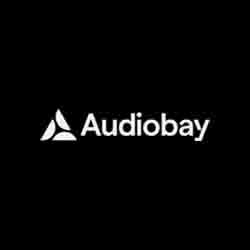
If you're a music producer looking to elevate your production quality, investing in the right audio equipment is crucial. Just as important as selecting the right gear is having access to high-quality music, which is why the best place to buy royalty-free songs is a critical resource. These tracks, often created by award-winning artists, can instantly enhance your projects, from YouTube videos to advertisements, offering instant licenses for personal or commercial use.
Let’s dive into the essential audio equipment every music producer needs and explore the best options available, whether you're a beginner or a seasoned pro.
Essential Audio Equipment for Music Producers
To create professional-sounding tracks, you need the right tools in your studio. Here are the essentials:
Audio Interfaces
An audio interface is the hub of your music production setup, allowing you to connect instruments, microphones, and speakers to your computer. High-quality interfaces ensure clear sound with low latency.
Focusrite Scarlett 2i2: Great for beginners due to its affordability and ease of use.
Universal Audio Apollo Twin: A favorite among professionals for its superior sound and onboard effects processing.
Studio Monitors
Unlike regular speakers, studio monitors provide a flat frequency response, letting you hear every detail of your mix without colorization. The right pair of studio monitors will make mixing and mastering far more accurate.
Yamaha HS8: Known for their clarity and precision.
KRK Rokit 5: A more budget-friendly option with strong bass response.
Digital Audio Workstations (DAWs)
A DAW is the software where all your production magic happens. From recording to mixing, it's the digital canvas for your music.
Logic Pro X: Ideal for Mac users and professionals.
Ableton Live: Popular for electronic music production.
FL Studio: Great for beginners and beatmakers.
MIDI Controllers
MIDI controllers help you compose and control your DAW with ease, from playing virtual instruments to automating effects.
Akai MPK Mini: Compact and affordable, perfect for small setups.
Novation Launchkey: Works seamlessly with Ableton Live and is great for live performances.
Headphones
Studio-grade headphones allow you to work on your music in more detail, especially when you're mixing late at night.
Audio-Technica ATH-M50x: A great all-rounder with balanced sound.
Beyerdynamic DT 990 Pro: Known for their comfort and detailed audio reproduction.
Premium Audio Gear for Advanced Producers
If you're serious about taking your production quality to the next level, these advanced tools are worth the investment.
High-End Microphones
A premium microphone can make a noticeable difference in vocal and instrument recordings. These mics capture every nuance with pristine clarity.
Neumann U87: A studio staple for professional-grade vocals.
AKG C414: Versatile and ideal for capturing a range of sounds, from vocals to guitars.
Outboard Gear
While digital plugins are convenient, outboard analog gear can add warmth and character to your recordings. Compressors, preamps, and equalizers are common pieces of outboard gear.
Universal Audio 1176: A legendary compressor used by top studios worldwide.
SSL G-Comp: A high-end analog compressor perfect for adding punch to your mixes.
Budget-Friendly Audio Equipment
Not every producer can afford premium gear, but that doesn’t mean you have to compromise on quality. Here’s a look at some affordable options that still deliver impressive results.
Budget Audio Interfaces
If you're starting out, these budget audio interfaces will give you solid sound quality without draining your bank account.
Behringer UMC22: A simple yet reliable interface for beginners.
Presonus AudioBox USB 96: Compact, durable, and cost-effective.
Affordable Studio Monitors
Great studio monitors don’t have to cost a fortune. These options provide accurate sound on a budget.
JBL 305P MkII: A highly-regarded option for under $150 per monitor.
Mackie CR3-X: Small but powerful monitors for home studios.
Room Acoustics and Soundproofing
Having the best equipment won’t mean much if your room’s acoustics aren’t treated properly. Room treatment is essential for achieving a true, balanced sound.
Acoustic Panels
Acoustic panels reduce unwanted reverb and echo, helping you hear your music more clearly.
Auralex Acoustics Studiofoam: Affordable and easy to install.
ATS Acoustic Panels: High-quality and customizable to match your studio aesthetic.
Bass Traps and Diffusers
Bass traps are crucial for controlling low frequencies, while diffusers help scatter sound evenly, reducing harsh reflections.
GIK Acoustics Bass Traps: Efficient at reducing low-frequency buildup.
Primeacoustic Scatter Blocks: Excellent diffusion and sound control for professional studios.
Conclusion
Whether you’re just starting out or looking to upgrade your studio, investing in the right audio equipment is key to producing high-quality music. From premium audio interfaces to budget-friendly monitors, each piece of gear plays an important role in shaping your sound. Don’t forget, beyond just the equipment, having access to top-notch, premium royalty-free music from the best place to buy royalty-free songs will also elevate your projects, ensuring your tracks sound polished and professional for any platform.
1 note
·
View note